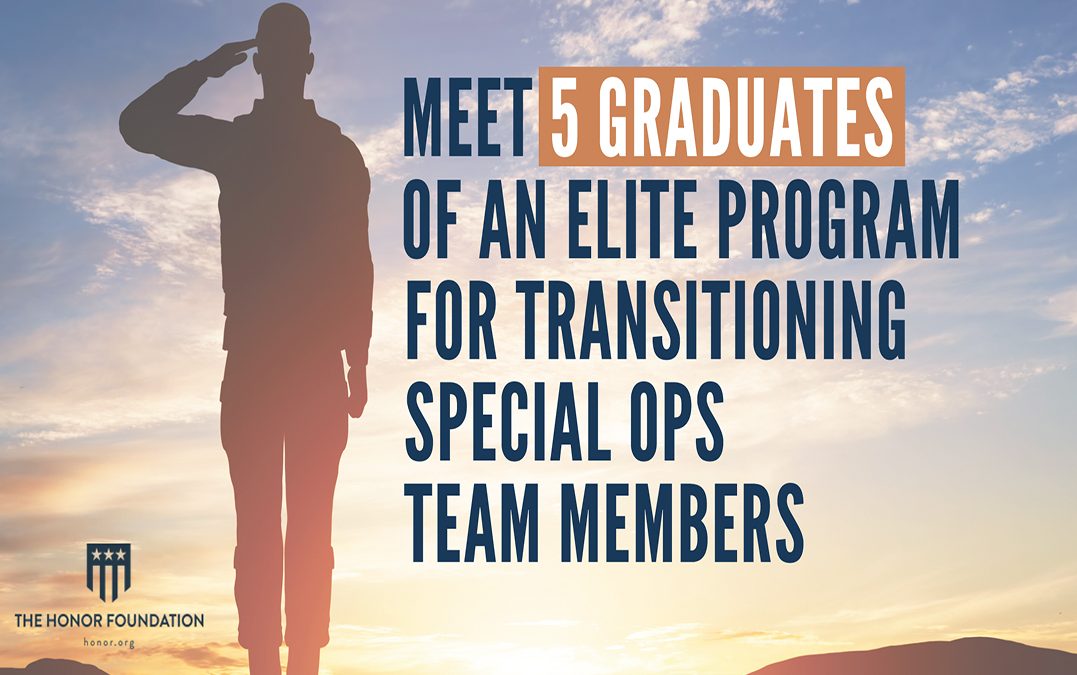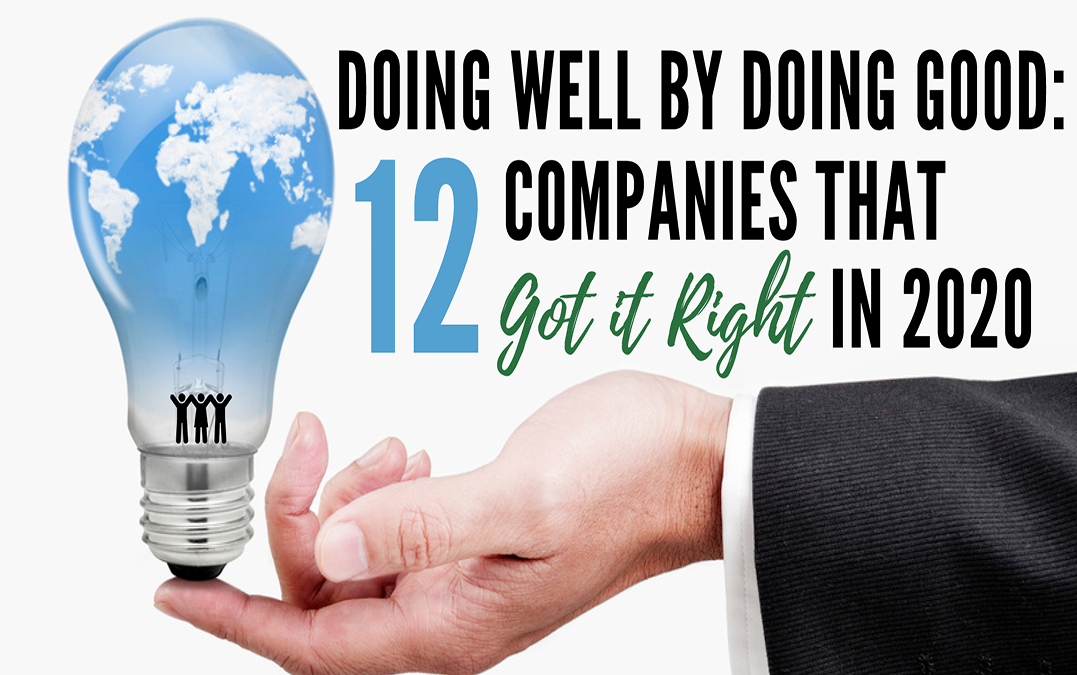
Leadership, People
For the past five years, I’ve had the privilege of serving as a pro bono coach for a San Diego-based nonprofit called The Honor Foundation. The program offers a 120-hour, MBA-style curricula that serves as a bridge for members of the Special Operations forces of the military to transition from service and discover what’s next on their career path.
Thanks to The Honor Foundation, these men and women have the tools they need to confidently enter the workforce with pride and a sure footing. They are prepared to take the leap of faith that the civilian world will honor their service, embrace their elite training, and place them in positions worthy of their talents.
It is my honor to introduce you to five members of the Group 35 graduating class.
1. Rusty Quinlan
What he brings to the team: Passionate storyteller with a desire to make an impact on the world by empowering highly creative teams to do what they do best. Over 10 years of progressively higher leadership and advisory positions with advanced skills in educational systems, complex problem solving, communication, and team coordination.
Education: Master’s Certification in Sound Design, Berklee College of Music, B.M. Music Education & Performance, Colorado State University, Fort Collins, CO
Areas of interest: Leading Diverse Teams through Complex Operations, Ops Management, Program Management, Training Curricula Design and Delivery, preferably in the media and entertainment industries
Availability: Rusty will transition his role as Division Chief, EOD Training and Evaluation in Q1 of 2021
.
2. Leif E. Mollo
What he brings to the team: Over 27 years of successfully leading, developing, and inspiring excellence, integrity, and resilience in high performing teams and leaders. A track record of proven leadership in crisis and ambiguity, excelling in the most challenging and complex no-fail environments. A team builder, trusted mentor, and empathic leader that fosters buy-in and commitment to an organization’s vision and mission, with a reputation for achieving results, fostering teamwork, and improving organizational climate and culture. Successfully transferred unique expertise into the world of professional sports.
Areas of interest: Director level, Chief of Staff, or other “connective tissue” position where his knowledge, skills, and abilities will help drive culture, develop people, and contribute to excellence and success across the entire organization.
Education: M.S. in Defense Analysis from Naval Postgraduate School, Monterey. B.S. in Political Science from the United States Naval Academy. Distinguished Graduate from both schools.
Availability: Leif is available for full-time, part-time, remote employment immediately
.
3. Seth Cummings
What he brings to the team: Proven leader with 25 years of experience leading high-performance teams, projects, programs, and portfolios. Seth has extensive experience coaching and mentoring team members to empower personal and professional development that benefits the team and organization at all levels. He focuses on developing individuals’ potential and leveraging insightful problem-solving skills to inspire and influence action.
Areas of interest: Director or Senior leader in the Non-profit or Management Consulting sectors. An ideal role is serving on a high performing team that values hard work and has a great atmosphere.
Education: B.A. in Strategic Studies and Defense Analysis from Norwich University
Availability: Seth will be available for full-time employment beginning on April 1, 2021
.
4. Peter Dorris
What he brings to the team: An extraordinary knack for innovative problem solving and team building honed by over 11 years of working on extraordinarily complex problems with diverse cross-functional teams. Peter works hard to ensure that his teams are empowered to accomplish goals with as much buy in as possible by keeping open lines of communication and embracing innovations in technology.
Areas of interest: Project / Program Manager in the technology solutions or medical device industry. An ideal role is serving on a high performing team at the cutting edge of innovation.
Education: B.S. Organizational Leadership, University of Charleston, MBA Candidate 2022 Concentration in Data Science and Business Analytics, Santa Clara Leavy School of Business.
Availability: Peter is available for full-time employment beginning January 1, 2021
.
5. Chris Merwin
What he brings to the team: Highly positive and deeply ethical senior executive with a passion for exceeding expectations that contribute to organizational success. Chris is keenly adept at finding clarity and anticipating challenges, ensuring strategic objectives are met with an eye toward generating a positive return on investment.
Areas of interest: Business Development and Sales Management in civilian or defense industries. An ideal role for Chris would be leading a high performing sales or consulting team that evaluates operational practices, finds efficiencies that realize cost savings and improves relationships with customers.
Education: Masters in National Security and Strategic Studies from the Naval War College, Bachelor of Science in Criminal Justice from the University of South Carolina
Availability: Chris will be available for full-time employment beginning January 2021
If your organization could benefit from service-minded, adaptable, problems solving leaders like these, there is no more elite group of talent than the graduates of The Honor Foundation. Contact The Honor Foundation here to learn more about employing, mentoring, coaching and sponsorship opportunities for the world-class program.
Question: What can you do to serve people who have dedicated their lives in service to others?
Driven by the premise that excellence is the result of aligning people, purpose and performance, Center for Executive Excellence facilitates training in leading self, leading teams and leading organizations. To learn more, subscribe to receive CEE News!

Leadership
The best organizations today understand that culture is their strongest asset and can be the glue to retaining top talent. Whether you nurture it or not, you have a culture. It may be empowering or toxic. Either way, the results are showing up on your bottom line.
Here are the 12 companies we featured in CEE News this year that show how doing well and doing good are not mutually exclusive.
1. In September 1970, economist Milton Friedman argued in an article for the New York Times Magazine that “the social responsibility of business is to increase its profits.” 50 years since that publication, leaders are still struggling with what, exactly, the social purpose of business should be. That struggle is being chronicled by Carl Erickson, Founder and Executive Board Chair of Atomic Object, a custom software design and development firm headquartered in Grand Rapids, Michigan. Erickson shares the existential angst behind the company’s vision for lasting for 100 years in the blog Great Not Big. [Read More]
.
2. If you start a new business this year, can you imagine it still thriving in the year 2110? 90 years ago, George Jenkins opened the first Publix Food Store in Winter Haven, Florida. Today, the business thrives not because of ping pong tables or kombucha on tap, but because of the enduring philosophy of treating people with dignity and giving them a stake in the company’s success. The Publix Super Markets of 2020 is the largest employee-owned grocery chain in the United States fueled by over 200,000 dedicated women and men. Jenkins’ philosophy of putting people first has landed Publix recognition as one of one of Fortune’s 100 Best Companies to Work For 22 years in a row, the South’s Best Grocery Store by Southern Living magazine (2018), and No. 2 among the Top Companies for Social Responsibility by the Harris Poll (2017). [Read More]
.
3. According to the U.N. Food and Agricultural Organization, 1.3 billion tons of food produced for human consumption is lost or wasted each year. In Canada, 58% of all food produced is wasted, according to a report by the food bank Second Harvest. Nada, Vancouver’s first zero-waste grocery store, was founded by Alison Carr and Brianne Miller. As a marine biologist, Miller witnessed the mass of plastics swirling in the oceans, most of which was tied to food packaging. She realized the grocery store system was broken, and asked a simple question. What if food was just food again? [Read More]
.
4. Last week, the global number of confirmed deaths from the coronavirus surpassed 50,000 and cases topped 1 million. With cases on the rise, corporations are stepping up to help support people in need of assistance and flatten the curve, like a program just rolled out by Expensify to support SNAP, the United States’ largest anti-hunger program. [Read More]
.
5. While most restaurants in America are shuttered, White House Italian Steak House in Anaheim, California, is hammered. Twice a week, cars line up by the hundreds, turning the fine dining experience into the ambiance of a Nascar pit stop. Owner Bruno Serato knows that most guests of this popup, bi-weekly drive through can pay no more than a heartfelt “thank you”. And that’s just fine by him. Bruno and his team are catering to the growing legions of the desperate. It’s a mission for which he is very well suited. He bought the mansion-turned-restaurant in 1987, and started serving Northern Italian cuisine in the style of his home in Verona, Italy. [Read More]
.
6. Brian Halligan was vacationing on Martha’s Vineyard in 2006, weighing the pros and cons of launching Hubspot. “One day,” according to Halligan “I’m looking at a book of cartoons from The New Yorker, and the first cartoon I open to shows this dog who’s just sitting at a computer on the Internet. A second dog is looking over his shoulder, like, what the heck are you doing on the Internet? And the dog on the Internet looks at the other guy and says, ‘You know, the great thing about the Internet is nobody knows you’re a dog.’” [Read More]
.
7. Jeffrey Costello and Robert Tagliapietra had just moved JCRT, their direct-to-consumer shirt company, to a new office on Pier 59 in New York City when New York’s stay-at-home order was issued in mid-March of 2020. Founded in 2016, JCRT is a modern menswear studio where craft meets tech through responsibly manufactured fashion. Their work has been exhibited at The Metropolitan Museum of Art and is in the permanent collections of The Victoria and Albert Museum and Museum at FIT. Heartsick that their beloved city was the epicenter of the Covid-19 outbreak, the couple immediately set to work to so something to help. [Read More]
.
8. If you’ve worn out a pair of walking shoes to break out of your Covid orbit, you might consider ordering your next pair from Allbirds. Founder Tim Brown, a native of New Zealand, was well versed in the qualities of merino wool. Inherently curious, Brown began asking himself why such a remarkable, sustainable resource was virtually absent in the footwear industry. And with that spirit of wonder, the Allbirds journey began. After years of researching and tinkering, Brown teamed up with Joey Zwillinger, an engineer and renewables expert. Together, they crafted a revolutionary wool fabric made specifically for footwear. The outcome? An entirely new category of shoes inspired by natural materials, and an ongoing mantra to create better things in a better way. [Read More]
.
9. Once a week, the employees at the HR Software company Workday get a two-question survey. On #FeedbackFriday, employees might be asked first about their relationship with their manager, and then to reflect on their own mental and physical health. The questions vary from week to week, but the survey creates a robust data set of responses from over 10,000 employees that can be mined to help ensure the company’s culture stays on track. From the day that the idea for the company was sketched out over lunch at Jax Truckee Diner in California in 2005, co-founders Aneel Bhusri and Dave Duffield resolved to build a company that would scale by tapping into a rich tapestry of diverse talent. [Read More]
.
10. 2020 has challenged leaders in ways they never expected. Outside of the healthcare industries, corporate leaders may feel unequipped to navigate the medical complexities that come with leading through a pandemic. Even the most seasoned leaders who’ve won accolades for setting vision, values, strategy, and culture have little understanding of the many unknowns that this pandemic and future ones might present. Yet, organizations now have a life or death role to play in protecting the health of employees, customers, and the public. One organization, Constellation Brands, has decided to add a new executive to the C-Suite – a Chief Medical Officer. [Read More]
.
11. Rajesh Anandan and his MIT roommate, Art Shectman, founded Ultranautswith one goal in mind: to prove that neurodiversity and autism could be a competitive advantage in business. “There is an incredible talent pool of adults on the autistic spectrum that has been overlooked for all the wrong reasons,” said 46-year-old Anandan in a recent interview with BBC. “People who haven’t had a fair shot to succeed at work, because of workplace and workflow and business practices that aren’t particularly effective for anyone but are especially damaging for anyone who is wired differently.” [Read More]
.
12. A little over one year ago this month, a young woman was hired to be a cashier at The Bazaar, Inc., a family-owned merchandising business in Chicago that has been around for three generations. When she walked in looking for a job, she seemed capable and bright and willing to work hard, and so she was extended an offer to come on board. She was thrilled—and so was her mother. [Read More]
Driven by the premise that excellence is the result of aligning people, purpose and performance, Center for Executive Excellence facilitates training in leading self, leading teams and leading organizations. To learn more, subscribe to receive CEE News!

Book lists, Leadership
In a year marked by disruption and uncertainty, this holiday season is the perfect time to read and reflect. We’ve selected a list of seven titles – from nature to biographies, from history to current events and re-imagining capitalism itself – these works are original, enjoyable, and provocative.
1. Becoming Wild by Carl Safina
What it’s about: Safina, the ecologist and author of many books about animal behavior, delves into the world of chimpanzees, sperm whales and macaws to make a convincing argument that animals learn from one another and pass down culture in a way that will feel very familiar to us.
An excerpt: “Change is the only constant, true enough. Change that comes too rapidly, however, brings the end of adaptation, the end of the line. That is the message whispered to us by many extinct species who’d thrived but could not cope with change that hit too fast, bit too hard.
2. The Man Who Ran Washington – The Life and Times of James A. Baker III by Peter Baker and Susan Glasser
What it’s about: This fascinating biography of the former secretary of state and consummate insider, who was once called “the most important unelected official since World War II,” reveals both Baker’s accomplishments and the compromises he had to make.
An excerpt: “Washington loves the ones who grease its gears. But history only remembers the ones who shift them,” the late Washington Post writer Marjorie Williams wrote of Baker. The man she profiled in the Post’s Style section upon his ascension to secretary of state in January 1989 was confident in this stature in the imperial capital at its twilight-of-the-Cold-War apogee, yet insecure enough to wake up each morning ready for battle to prove it. He represented the city’s ideal of itself, a relentless but nonetheless patrician competitor willing to drink a Scotch with his rivals after hours, an Ivy League country-clubber equally at home in tennis whites or toting a shotgun to a duck blind in predawn Texas.”
3. The Splendid and the Vile: A Saga of Churchill, Family, and Defiance During the Blitz byErik Larson
What it’s about: Larson’s account of Winston Churchill’s leadership during the 12 turbulent months from May 1940 to May 1941, when Britain stood alone and on the brink of defeat, is fresh, fast and deeply moving.
An excerpt: “Late that night Churchill lay in bed, alive with a thrilling sense of challenge and opportunity. ‘In my long political experience,’ he wrote, ‘I had held most of the great offices of State, but I readily admit that the post which had now fallen to me was the one I like the best.’ Coveting power for power’s sake was a ‘base’ pursuit, he wrote, adding, ‘But power in a national crisis, when a man believes he knows what orders should be given, is a blessing.’ He felt great relief. ‘At least I had the authority to give directions over the whole scene. I felt as if I were walking with destiny, and that all my past life had been but a preparation for this hour and for this trial…Although impatient for the morning I slept soundly and had no need for cheering dreams. Facts are better than dreams.’
4. Reimagining Capitalism in a World on Fire by Rebecca Henderson
What it’s about: With the world both literally and metaphorically on fire right now, just about everyone is desperate to figure out how to save the situation, including capitalists. They might want to pick up this book by renowned Harvard professor Rebecca Henderson, which attempts to outline how making a profit can be reconciled with a healthier society and a healthier earth.
An excerpt: “I am convinced that we have a secret weapon. I spent twenty years of my life working with firms that were trying to transform themselves. I learned that having the right strategy was important, and that redesigning the organization was also critical. But mostly I learned that these were necessary but not sufficient conditions. The firms that mastered change were those that had a reason to do so: the ones that had a purpose greater than simply maximizing profits. People who believe that their work has a meaning beyond themselves can accomplish amazing things, and we have the opportunity to mobilize shared purpose at a global scale.”
5. The Undocumented Americans by Karla Cornejo Villavicencio
What it’s about: Cornejo Villavicencio was one of the first undocumented students to be accepted into Harvard University. In her captivating and evocative first book, she tells “the full story” of what that means — relying not just on her own experience but on interviews with immigrants across the country.
An excerpt: “This book is not a traditional nonfiction book. Names of persons have all been changed. Names of places have all been changed. Physical descriptions have all been changed. Or have they? I took notes by hand during interviews; after the legal review, I destroyed the notes. I chose not to use a recorder because I did not want to intimidate my subjects. Children of immigrants whose parents do not speak English learn how to interpret very young, and I honored that rite of passage and skill by translating the interviews on the spot. I approached translating the way a literary translator would approach translating a poem, not the way someone would approach translating a business letter. I hate the way journalists translate the words of Spanish speakers in their stories. They transliterate, and make us sound dumb, like we all have a first-grade vocabulary.”
6. The Saddest Words: William Faulkner’s Civil War by Michael Gorra
What it’s about: Gorra’s complex and thought-provoking meditation on Faulkner is rich in insight, making the case for the novelist’s literary achievement and his historical value — as an unparalleled chronicler of slavery’s aftermath, and its damage to America’s psyche.
An excerpt: “Faulkner’s South seems as if it can’t forget anything. It accepts reunion only insofar as it can recall itself as a place apart, and yet that memory, paradoxically, is also a form of forgetting. For in the first decades after the war the white South remembered its defeat above all; it saw itself as the victim of a rapacious conqueror, forgot its own acts of aggression and indeed atrocity, and thought of slavery only as something now lost. And the white North had its own ways of forgetting too….”
7. A Promised Land by Barack Obama
What it’s about: The former president’s memoir — the first of two volumes — is a pleasure to read, the prose gorgeous, the detail granular and vivid. From Southeast Asia to a forgotten school in South Carolina, he evokes the sense of place with a light but sure hand. His focus is more political than personal, but when he does write about his family it is with a beauty close to nostalgia.
An excerpt: “What I can say for certain is that I’m not yet ready to abandon the possibility of America – not just for the sake of future generations of Americans but for all of humankind. For I’m convinced that the pandemic we’re currently living through is both a manifestation of and a mere interruption in the relentless march toward an interconnected world, one in which people and culture can’t help but collide. In that world – of global supply chains, instantaneous capital transfers, social media, transnational terrorist networks, climate change, mass migration, and ever-increasing complexity – we will learn to live together, cooperate with one another, and recognize the dignity of others, or we will perish. And so the world watches America – the only great power in history made up of people from every corner of the planet, comprising every race and faith and cultural practice – to see if our experiment in democracy can work. To see if we can do what no other nation has ever done. To see if we can actually live up to the meaning of our creed.”
Question: What books are on your Christmas wish list this year?

Leadership
Let’s face it. Most of us are terrible listeners. As we fought our way up the corporate food chain, our conversations were opportunities to prove our intellectual prowess. We wanted to get ahead and stay ahead, and that meant convincing others that our ideas were the best.
By the time we become senior leaders, anyone who dares to challenge our ideas gets the full force of our well-honed ability to establish that we’re right. Winning all the debates becomes the norm. We actually begin to believe that we are the smartest person in the room. But deep down, we know that we don’t have all of the answers. We don’t even have all of the questions.
Danger often has a very weak signal
It’s critical to be able to hear danger, which often has a very weak signal. If there is a lag in your ability to hear it, you’re going to be in trouble because the rest of the world – the press, social media – is a gigantic amplification system for these signals. The failure may happen rapidly — the danger signal came, you didn’t react, and it got you. Or it may occur in a more gradual way, when an accumulation of all your bad listening practices erodes personal relationships, causes you to make lower-quality decisions, or leaves you unable to monitor implementation. Eventually, executives who don’t listen lose the support of their teams and colleagues. And once you’ve lost that support, it’s almost impossible to get it back. You can’t be effective, and you will fail.
Changing behavior requires humility
Most people under appreciate the complexity of listening, the skills needed, and the value of doing it well. Everybody says you need to be a good listener, but it’s often more lip service than conviction.
Listening can be learned, but to change your behavior on any important dimension you’ve got to have deep self-awareness. You have to want to change — you can’t fake it. You have to move from 90% tell, 10% listen to closer to 50-50.
This requires patience. Conversations with many senior leaders have the following subtext: “I’m smarter than you and I know what you’re going to tell me, so let’s make this really efficient for both of us. I won’t have to listen, and we can get to the really important part of the conversation: me telling you what to do.” What does this save, really? Three minutes? We’ve all got three minutes to spare. When you boil it down, it’s not really about efficiency. It’s about humility.
Of course, at the other extreme, listening doesn’t mean being a witless receiver of information or taking a monk-like “hear and say nothing” posture. We have to process what we’re hearing, think about what it means, and make decisions. Still, before you make a decision, you’ve got to make sure the listening has happened so that you have sufficient information.
Most of the job of a senior executive is not about deciding on the right thing to do–that’s pretty easy. The hard part is setting aside your own hubris to become better at questioning than answering, and listening for the signals.
Question: How much time do you spend talking versus listening in meetings?
Driven by the premise that excellence is the result of aligning people, purpose and performance, Center for Executive Excellence facilitates training in leading self, leading teams and leading organizations. To learn more, subscribe to receive CEE News!

Leadership
Picture this. The CEO needs to make a decision about a cost-saving measure, and has turned to your team for advice. In support of the initiative to go paperless, she wants to eliminate either pens or pencils from use by employees across the organization. The program will be considered a success if it is rolled out in 30 days from today, 100% of employees have converted from the legacy writing instrument, and employee morale does not drop.
As ridiculous as this initiative may sound, parts of this scenario sound all too familiar. Teams are often given limited time, little supporting data, and high expectations to make decisions that will have enterprise-wide impact.
What is also familiar is that teams are working on several other initiatives with compressed due dates. When the topic of pens versus pencils comes up on the team meeting agenda, only one member of the team has a strong position. Let’s call him the Advocate. The Advocate has studied the issue, has prior experience with a successful rollout of a similar initiative, and has drafted a plan to share with the team.
When the issue is brought up at a meeting, the team members are scattered in focus, and don’t practice the listening skills that would take advantage of the Advocate’s expertise and passion. Instead, they fall into four types of listeners: Ignore, Volley, Judge, and Apply.
Ignore. The Ignorer must attend the meeting, but obviously has other issues pressing for his attention. He’s buried in his phone, but throws out occasional comments like “Uh huh” or “Wait. What are we talking about?” from time to time. His guiding statement is, “You’re not important to me right now.”
Volley. This person doesn’t really agree or disagree with the Advocate about this issue, but wants to be a part of the conversation to get his own remarks on record. He’s preparing his comeback while the Advocate is talking, and interrupts in mid-sentence. His guiding statement is, “You think that’s right/wrong, I can top that.”
Judge. She strongly disagrees with the Advocate about this issue. She’s constantly fact-checking, and making assumptions and conclusions before she hears out the Advocate. Her guiding statement is, “Here’s your problem.”
Apply. This person considers the Advocate a subject matter expert and is here to learn, but not ask clarifying questions or offer feedback. She pays close attention as she downloads information from the Advocate and her other teammates. Her guiding statement is, “What can I take away and keep myself safe?”
Scenarios like this play out all too often in the workplace. The ability for teams to share information, and make decisions gets bogged down by the inability to listen. Instead, we accept unproductive listening behavior. We let Ignoring, Volleying, Judging, and Applying pass for listening. But to truly hear one another productively, we must practice listening with empathy, as follows:
Empathize. Team members don’t initially agree or disagree with the Advocate, but are present to the Advocate’s words and, more importantly, are open to being changed by what is said. They give their full attention to the Advocate’s words and body language. They stay curious, make an emotional connection, and set aside their own agenda. Their guiding statement is, “What are you experiencing?”
Listening with empathy takes practice. It requires being fully present to the thoughts and feelings of others, setting aside ego, and being open to information that may change your paradigm about an issue. As you go through your workday, take note of how many of the five levels of listening take place among your team members, and how your team would benefit by practicing listening with empathy.
Download our 5 Levels of Listening free resource. Ask yourself which of these 5 levels of Listening are you participating in. If you find yourself regularly falling into the Ignoring, Volleying, Judging, or Applying levels of listening, take some time to remember the prescription for that level, so that you can become a more Empathetic listener.
Question: Which of the five levels of listening do you practice in your team meetings?
Driven by the premise that excellence is the result of aligning people, purpose and performance, Center for Executive Excellence facilitates training in leading self, leading teams and leading organizations. To learn more, subscribe to receive CEE News!

Leadership
Over the past 10 years, I have been honored to explore and debate the essence of power with Dr. Tony Baron, Co-Founder of Center for Executive Excellence. Specifically, how power impacts leadership, how leadership impacts culture, and, ultimately, how culture impacts performance. With a double doctorate in psychology and theology and decades of executive coaching experience with Fortune 100 companies, you can imagine the depth and breadth that Tony adds to the subject. – Sheri Nasim
By: Dr. Tony Baron
Nobody likes to be labeled. And nobody likes to be misunderstood. Given the context of our national dialogue recently, this may be a good time to talk about how to respond, instead of react, when we are misunderstood.
I am not talking about times when there is a lack of clarity in communication. I am talking about when others judge you based on misinformation they have received (or conceived) that results in them questioning your character.
The injustice hurts deeply. But, as leaders, our ultimate responsibility is to not to react, but to respond, by modeling the behavior we would like to see in others. It is a true test of how we use power. Will we use our position to force others to bend to our will? Or, will we use our position to practice the discipline of transformative leadership?
Here are four ways that you can practice transformative leadership and respond, rather than react, when others attack your character:
1. Practice the Discipline of Not Having the Last Word
A transformative leader influences others by modeling appropriate behavior not only in positive situations but also in periods of criticism. When people attack your character, they often want to engage you in a verbal volley. Don’t do it. Transformative leaders have the discipline to not have the last word.
2. Practice the Discipline of Humility
An attack on your character may immediately send you into defense mode. If you have power, you may be tempted to use that power to punish the person who is attacking you. However, a transformative leader must refrain from presuming you can silence another person, and refrain from letting others know how wronged you feel. Humility comes from the word “grounded.” A grounded person reflects deeply to see what truth may be in the midst of falsehoods, what path may be used for reconciliation, and what direction you need to follow.
3. Practice the Discipline of Civility
A transformative leader understands that people who attack their character often betray their own fears and anxieties in the process. When people spew words at you in anger, recognize the pain or anxiety behind their words. Pause to reflect before you engage, then practice the discipline of civility. In Reclaiming Civility in the Public Square, civility is defined as “claiming and caring for one’s identity, needs, and beliefs without degrading someone else’s in the process.”
4. Practice the Discipline of Wisdom
Knowledge is a compilation of things true, maybe true, and definitely not true. Knowledge can lead to pride and a sense of superiority over others. Wisdom, on the other hand, is insight into reality. Reality is the only thing a transformative leader can count on. People of wisdom seek reality – not illusions, innuendos, or ill feelings.
So, to those who feel you have been misunderstood, take courage in the midst of adversity. Seek reconciliation. Practice the discipline of not having the last word, humility, civility, and wisdom.
Question: Have you felt misunderstood recently? Which of these practices might help you respond instead of react?
Driven by the premise that excellence is the result of aligning people, purpose and performance, Center for Executive Excellence facilitates training in leading self, leading teams and leading organizations. To learn more, subscribe to receive CEE News!






























